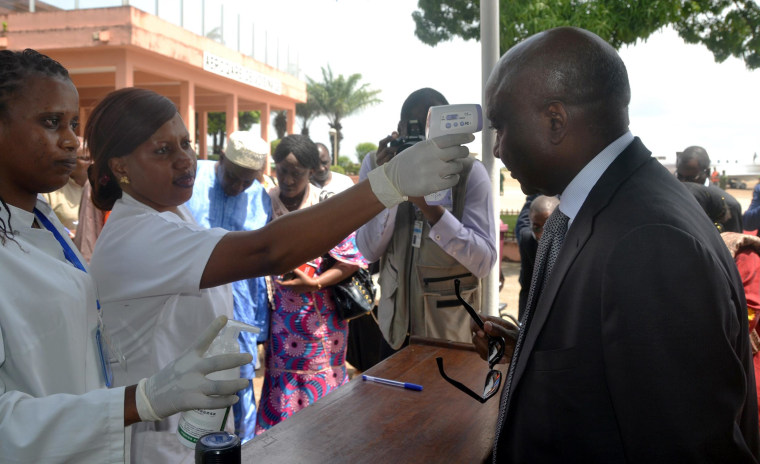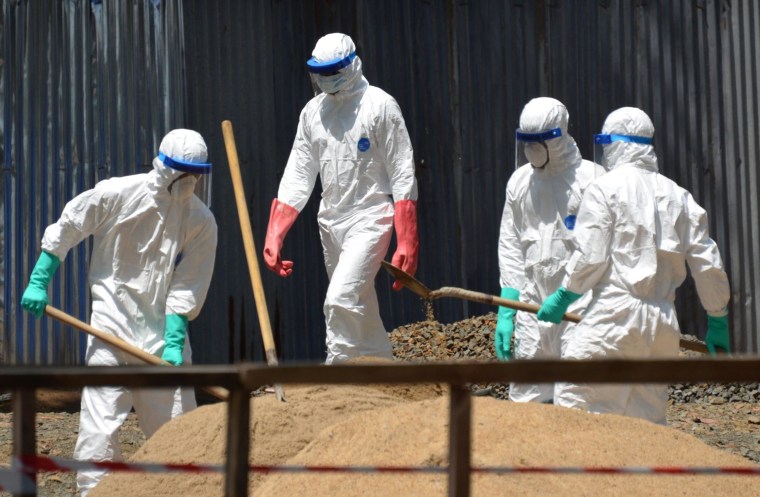Corruption, distrust of outsiders that has led to murder and a thriving black market in blood are adding to the chaos at the epicenter of the Ebola epidemic in West Africa and challenging efforts to stop the disease at its source, according to a series of daily U.S. military dispatches reviewed by NBC News.
Six weeks’ worth of summaries of the crisis by officers assigned to Operation United Assistance, the Pentagon’s aid program, document problems like the loss of front-line medical workers and increasing concerns about the food supply and civil unrest in the hardest hit region.
The unclassified reports reviewed by NBC News, dating from mid-September through this week, paint a stark picture of the many challenges facing authorities at Ground Zero of the epidemic. Each contains maps showing the spread of the disease, fresh intelligence and news -- even weather reports and analysis of how it might affect the delivery of assistance.
While the reports indicate progress is being made in the effort to check Ebola in Guinea, Liberia and Sierra Leone, they repeatedly state that distrust of national governments among villagers in affected areas is hindering the effort. Aid workers and members of the news media are regularly intimidated, and, in at least one case, a group of health-care workers and reporters were killed in Guinea, according to a Sept. 19 report.
"The group was stoned and found hidden in the village’s septic tank," according to the dispatch, which did not say how many people died in the incident. "The reason for the killings is unknown. It is likely the villagers murdered the group fearing they would be diagnosed with Ebola and removed to quarantine. Press reports (indicate) many locals have the rationale that a diagnosis will result in certain death or being taken away from their families. The onset of civil unrest is sure to increase as fear spreads and the international community endures roadblocks in bringing awareness to the population."
John Campbell, a former U.S. ambassador to Nigeria and now director of the African program at the Council on Foreign Relations, said that distrust of government is endemic in Africa, but “particularly acute in those three states because they have had civil wars in recent years.”
He also said that a sizable portion of the population in the rural areas live in a “premodern and prescientific environment,” which adds to their fear and mistrust.

“Locals say they aren’t going to adhere to quarantine because they believe Ebola is caused by witchcraft,” he said. “… In cases like that, all the science is fundamentally irrelevant.”
Another report, dated Oct. 18, indicates that burial teams dispatched by the governments to safely dispose of the bodies of Ebola victims also have been subjected to intimidation -- and fallen into corruption schemes.
"Traditional burial practices – including washing and dressing the body for burial, touching the body at the funeral, and communal meals at funerals – expose individuals to the virus and have facilitated the transmission of Ebola in Guinea, Liberia, and Sierra Leone,” it said.
"Reports have surfaced in Liberia of burial management teams accepting bribes to leave bodies in communities or provide certificates stating the dead did not die from Ebola, and therefore could be buried traditionally. Families reportedly can get dispensations for proper burials, even for Ebola victims, but this requires political connections."
Laurie Garrett, senior fellow for global health at the CFR, said the chicanery came to light early in the current epidemic.
“One of the first clues that something was going on was there appeared to be a ridiculously low death rate from Ebola –- a 49 to 51 percent mortality rate,” compared to a rate of between 70 percent and 90 percent of those infected during previous outbreaks, she said. The difference was that Ebola was not being listed as a cause of death, she said.
The Pentagon reports also note that even efforts to use science – in this case, transfusions – in the rural areas are backfiring, citing the black market in blood from outside the Ebola zone, which has become a very valuable commodity, but one that often carries other diseases.
"The use of blood purchased via the black market increases the risk of spreading HIV/AIDS, malaria and other blood-borne diseases,” said a Sept. 23 dispatch. “The spread of derivative diseases has the potential to divert time and resources originally allocated to control Ebola."
Garrett told NBC that no such black market existed before the current Ebola outbreak.
“Before all this happened, the black market in blood was basically zero,” she said, adding that the blood banking system in poorer countries in Africa is “abysmal.” Such a blood black market existed in the region in the 1970s, when it was used to treat malaria, she said, but the AIDS crisis put an end to it.

Other reports by the Pentagon team note that while many countries have sent doctors and other medical experts to the region, rural clinics often lack "low-level" local medical staff, many of whom have already died from the virus. Without such staff, other international assistance is "useless," an analyst wrote in an Oct. 10 report. The analyst added that overcrowding and long waits at clinics is leading many with Ebola to forgo medical treatment, likely resulting in an undercount of the number of victims.
"Cases are likely underreported as many affected residents remain untreated and die in their homes due to overcrowded ETUs (emergency treatment units) in Sierra Leone," the report stated.
Exacerbating the situation are strikes and threats of strikes by local health care workers, particularly in Liberia, the reports say. The issues are, not surprisingly, working conditions as well as pay.
A report from Sept. 18 noted that at one Sierra Leone hospital, 38 staff have died and those remaining hadn't been paid in two weeks. Reports on Oct. 10 and 11 noted that even in the capital cities of Monrovia in Liberia and Conakry in Guinea, clinics were facing possible shutdowns, either because of workers walking off the job or the rising death toll among health care professionals.
Growing concerns about the food supply have surfaced more recently.
A report dated Oct. 14 said that 40 percent of all the farms in Sierra Leone have been abandoned as farmers leave affected areas. The same report quoted a U.N. agricultural official as saying unless the situation is reversed, it could lead to "a hunger crisis of epic scale in West Africa."
“If communities begin to migrate due to failing crops, the spread of (Ebola) could accelerate across Liberia and beyond."
Earlier reports noted that the movement of farmers from rural areas to the affected areas cities also could speed the spread of Ebola.
"The loss of crops due to medical fears will further exacerbate the already strained economic conditions and could lead communities to migrate to areas they believe will be able to provide food and water,” said one. “If communities begin to migrate due to failing crops, the spread of (Ebola) could accelerate across Liberia and beyond."
Related
Ebola Death Toll Nears 5,000 Out of More Than 10,000 Cases
Mali's First Ebola Patient, 2-Year-Old Girl, Dies
New York and New Jersey Will Quarantine Ebola Doctors
Those who stay behind also face higher risk of contracting the disease. A Sept. 25 report notes that the "food supply has been scarce, increasing the reliance on potentially infected bush meat. As females are also the predominant preparer of food, this increases their risk of contracting the virus through infected meat."
Already, the reports note, women make up a disproportionate number of Ebola victims in the three countries, accounting for between 55 percent and 75 percent of the dead. In addition to preparing food, women also often prepare bodies of the dead for burial, potentially exposing them to the virus in Ebola deaths.
Follow NBC News Investigations on Twitter and Facebook.
The dedication of medical resources to the Ebola crisis also is triggering an increase in infant mortality, as women are not receiving prenatal care and are delivering babies outside medical facility, said another dispatch.
Another noted that the three countries lack “a coherent plan for orphaned children," whose numbers are rising with the death of their parents, particularly mothers. The lack of such a plan, it said, will like to lead to more looting and violence across the region.
Garrett, the global health expert at the Council on Foreign Relations, said that in their totality, the reports make clear that authorities have not yet turned the corner in controlling the Ebola epidemic.
“We are still in ascendancy on this thing,” she said. “There is no slowdown.”
